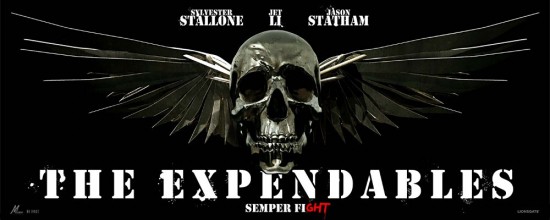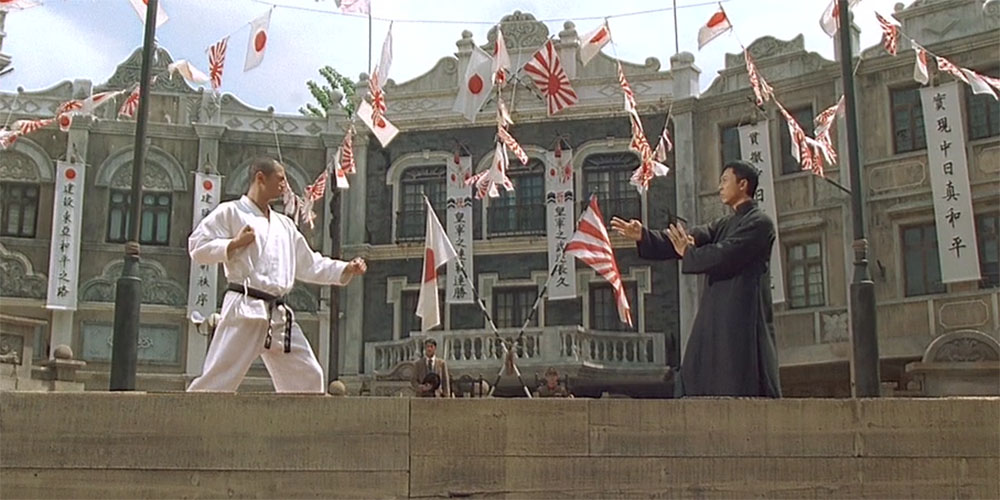
The Expendables
- MPAA Rating: R
- Release Date:
- US (wide): August 13, 2010
- Genre: Action
- Other Genres: Adventure, Thriller
- Studio: Lionsgate
- Tag Line: Semper Fight.
- Language: English
- Filming Locations: Brazil, New Orleans
We've been waiting a long time for this one. In the 1980s you couldn't move for testosterone-fuelled action flicks that were light on plot but heavy on body count. These films made movie gods of Sylvester Stallone, Arnold Schwarzenegger, Bruce Willisand the like while at the same time cleaning up at the box office and teaching the youth of the world that a grenade was the best way to solve any argument.
Then the celluloid landscape changed. Society embraced the modern man more in touch with his feminine side, and 9/11 and the shift in global geo-politics that followed demanded a more thoughtful approach to the genre, creating heroes with a conscience like Batman, Bourne and the rebooted Bond.
There's therefore been a gap in the market for a film filled with guns, knives and explosions; a gap that Stallone looks to fill withThe Expendables, his big-budget action spectacular that immediately takes you back to those halcyon days of bad quips and mindless violence.
It helps that Stallone takes the lead role of Barney Ross, cigar-chomping leader of a ruthless team of mercenaries available for the most dangerous of missions should the price be right. Sly is just the right guy to lead this disparate band of brothers, allowing him to re-claim his action crown while at the same time gently sending up his former glories.
Jason Statham is also electric as his number two Lee Christmas, a former SAS man who's as quick with a knife as he is with a put-down. Statham is one of the most bankable action stars in the world right now, and it's a blast watching him banter with Stallone; a double act that's the perfect marriage of old and new.
The rest of the crew similarly mixes the old guard with young pretenders, featuring Jet Li as master of close quarter combat Yin Yang, Randy Couture as demolitions expert Toll Road, Terry Crews as long-barrel weapons specialist Hale Caesar and last, but most certainly not least, precision sniper Gunnar Jensen, played with true menace by Dolph Lundgren.
Proceedings kick off in Somalia with the team taking on a gang of greedy pirates, and it immediately becomes clear that Lundgren is the liability in the group, a combination of drugs, combat stress and a worryingly short fuse causing the man mountain to violently erupt at the drop of a hat. So while they successfully complete the mission in bloody and uncompromising fashion, cracks are already appearing within the group.
Back home they visit the Expendables HQ - a tattoo parlour run byMickey Rourke of course - where the call comes in for a job that no one else wants to take. Intrigued by the mysterious offer, Stallone agrees to meet mysterious point man Mr. Church, so setting up the film's most heavily hyped sequence, in which Sly, Schwarzenegger and Willis finally share the screen.
Unfortunately, the scene fails to ignite, the banter between the titanic trio awkward and forced, the gags for the most part falling flat. The brief conversation does end with a great gag at the expense of the Governator, but having waited more than 20 years to see the three action legends tear up the screen together, the result is something of an anti-climax.
As is this early portion of the film. Stallone agrees to take the mission, which involves overthrowing the murderous dictator of the fictitious island of Vilena, but it takes an age to get to the next wedge of action.
When it does finally arrive it's a belter however, with Stallone and Statham's reconnaissance mission becoming compromised, forcing the pair to engage in a grandstanding attack on the island's port in a 1950s Albatross sea-plane. As ludicrous as it is marvellous to behold, it's the film's true stand-out moment, and really has to be seen to be believed.
That said, from here-on-in it's pretty standard stuff, the team split over completing the mission, with Stallone determined to return for the standard 'one last shot' at redemption and the rest of the lads not quite as keen on the 'almost certain death' that entails.
There are a couple of twists and turns along the way involving the identity of the enemy, the motives of a beautiful local freedom fighter, and the loyalty of the Expendables themselves, but if you've watched even a handful of '80s action classics, you'll see them coming a mile off.
But let's be honest, no one is watching The Expendables for plot, and in terms of murder and mayhem, the film delivers in spades.
The ultra-violence is of the cartoon variety, with our heroes snapping necks, smashing torsos, punching fire and defying logic at every turn. However, much of this carnage comes at the expense of action that's easy on the eye. In recent years the Bourne films have proved that a well-choreographed fight sequence can be as impressive as any explosion, and yet The Expendables fails to feature even one truly memorable punch-up.
But if it's simply kills you're after, there's death aplenty in the final few reels, as the cast breaks bones and spills blood with true gusto. As previously mentioned, Stallone and Stath make a fine central pairing, trading gags and insults as if they have been friends for years, lending credence to the history and mythology of the team.
Unfortunately, the rest of the Expendables don't fare quite as well, Li and Lundgren excelling on the action front but struggling when they actually have to act and emote.
Crews and Couture fare better, killing with the best of them and delivering their lines with mischievous twinkles in their eyes, but due to the ensemble nature of the project, the pair are relegated to supporting characters for much of the run-time.
On the villainous side, David Zyas is passable as the bloodthirsty despot, Eric Roberts is at his sleazy best as a rogue CIA operative, and Steve Austin fills the screen with bulk and menace as murderous henchman Paine.
Special mention should also go to Rourke as the pipe-smoking former expendable who now brokers their clandestine missions. Never one to knowingly under-act, he delivers a ridiculous speech mid-way though the film with such conviction and intensity that it could win him an Oscar and a Razzie all at once.
It's a definite highlight in a film that's filled with moments to make action geeks cheer. For while Stallone has taken the '80s formula and endeavoured to contemporise it, The Expendables is very much a throwback to a bygone era, when men were true men; ripping rivals apart with their bare hands.
It's just frustrating that it doesn't have more moments like the aforementioned sea-plane spectacular. Or a fight that pits Rocky IV rivals Stallone and Lundgren against each other. Or a sequence in which Bruce Willis kicks ass rather than just talking about it. These may be fan-boy fantasies, but having assembled such an amazing cast, Stallone seems to have missed as many opportunities as he has nailed in terms of crafting the ultimate action flick.
It's not that the film fails on any specific level, just that there seemed to be the potential for so much more with the talent involved and the master of action at the helm.
That said, perhaps he's saving all of the above for the sequel, so here's hoping we get further opportunities to spend time with The Expendables as they continue to kick ass, take names and do us all proud by setting the genre back 20 years.


 Two duely appointed federal marshalls, Teddy (Leonardo DiCaprio) and Chuck (Mark Ruffalo), venture into Shutter Island, a secluded psychiatric facility where a psychologist (Ben Kingsley) experiments with new forms of therapy in 1954, to help them track down a particularly ill patient who has disappeared seemingly out of her cell.
Two duely appointed federal marshalls, Teddy (Leonardo DiCaprio) and Chuck (Mark Ruffalo), venture into Shutter Island, a secluded psychiatric facility where a psychologist (Ben Kingsley) experiments with new forms of therapy in 1954, to help them track down a particularly ill patient who has disappeared seemingly out of her cell.